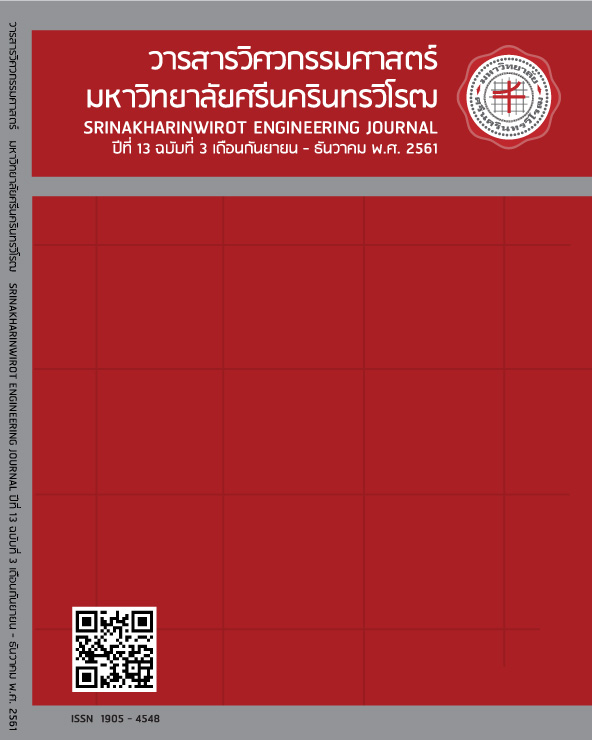Engineering Performance of Asphalt Concrete by Marshall Test Using Different Reclaimed Asphalt Pavement Content
Main Article Content
Abstract
This article aims to study the performance of asphalt concrete by Marshall Test using different reclaimed asphalt pavement (RAP) content. The experimental design detailed in this study included the use of one limestone aggregate source, no separation of RAP such as 10, 20, 30, 40, 50, 60 and 70 percent by mass of aggregate, asphalt cement (AC 60-70) at 5 percent by mass of aggregate. The research methodology used Marshall Test and binder course 19.0 mm in laboratory conditions. The study found that when using the amount of no separation of RAP in the range of 10 to 40 percent by mass of aggregate had job mix formula properties to meet the requirements of Asphalt Hot-Mix Recycling. The study found that RAP had a indirect tensile strength of 579.4 to 953.7 kPa, a resilient modulus of 1,242.0 to 1,504.1 kPa, static creep of 0.4935 to 0.9938 percent and dynamic creep of 3,870 to 4,774 microstrain.
Article Details
Copyright belongs to Srinakharinwirot University Engineering Journal
References
[2] K. Su, Y. Hachiya and R. Maekawa, “Study on recycled asphalt concrete for use in surface course in airport pavement,” Resources Conservation and Recycling., vol. 54, pp. 37-44, 2009.
[3] F. Xiao, S. N. Amirkhanian, J. Shen and B. Pytman, “Influences of crumb rubber size and type on reclaimed asphalt pavement (RAP) mixtures,” Construction and Building Materials., vol. 23, pp. 1028-1034, 2009.
[4] G. Valde’s, F. Perez-Jimenez, R. Miro, A. Martinez and R. Botella, “Experimental study of recycled asphalt mixtures with high percentages of reclaimed asphalt pavement (RAP),” Construction and Building Materials., vol. 25, pp. 1289-1297, 2011.
[5] N. Nokkaew and D. Parakul, “Physical Properties of Asphalt Concrete by Marshall Test Using Different Reclaimed Asphalt Pavement Content,” Srinakharinwirot Engineering Journal, vol. 11, no. 1, pp. 28-37, January-June, 2016.
[6] Asphalt Hot-Mix Recycling, Standard No. DH-S 410/1995.
[7] Test for Gradation of Aggregate by Dry Sieve Analysis, Test Number DH-T 204/1973.
[8] Test for Asphaltic Concrete by Marshall, Test Number DH-T 604/1974.
[9] AASHTO T 283, Standard Method of Test for Resistance of Compacted Asphalt Mixtures to Moisture-Induced Damage, 2014.
[10] ASTM D 4867, Standard Test Method for Effect of Moisture on Asphalt Concrete Paving Mixtures, ASTM International, West Conshohocken, PA, 2014.


